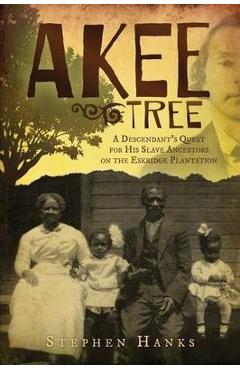Akee Tree: A Descendant\'s Quest for His Slave Ancestors on the Eskridge Plantations - Stephen Hanks

Detalii Akee Tree: A Descendant\'s Quest
libris.ro
156.67 Lei
195.84 Lei
History
Stephen Hanks
Akee Tree: A Descendant\'s Quest - Disponibil la libris.ro
Pe YEO găsești Akee Tree: A Descendant\'s Quest de la Stephen Hanks, în categoria History.
Indiferent de nevoile tale, Akee Tree: A Descendant\'s Quest for His Slave Ancestors on the Eskridge Plantations - Stephen Hanks din categoria History îți poate aduce un echilibru perfect între calitate și preț, cu avantaje practice și moderne.
Preț: 156.67 Lei
Caracteristicile produsului Akee Tree: A Descendant\'s Quest
Comandă Akee Tree: A Descendant\'s Quest Online, Simplu și Rapid
Prin intermediul platformei YEO, poți comanda Akee Tree: A Descendant\'s Quest de la libris.ro rapid și în siguranță. Bucură-te de o experiență de cumpărături online optimizată și descoperă cele mai bune oferte actualizate constant.
Descriere magazin:
What would compel an African-American man to spend ten years of his life tracing his family tree from the Pacific Northwest back to slavery times in Mississippi, and ultimately to its African roots? For author Stephen Hanks his quest begins with mere curiosity when he reads the obituary of his uncle, and soon blossoms into a full-blown genealogical investigation. Using standard genealogical tools-interviews, census records, and other sources-he delves into the past, soon finding that he must follow two families, his own and that of those who held his ancestors in bondage. The search takes on a life of its own when Hanks discovers some of the present-day descendants of plantation owner and slaveholder Richard Eskridge. With their help he is able to follow the trail back to Colonel George Eskridge of Virginia, whose namesake was none other than George Washington, the Father of Our Country. Hanks continues to probe, and eventually identifies and visits the homeland of his ancestors in Africa. Akee Tree is not only an honest and unbiased exploration into one family\'s history; it is a search for identity for a man and his people. Revealing and at times painful, the reader shares the joy of discovery and the shock of realization as author Hanks uncovers the truth about his ancestors. This objective and dramatic account is a powerful testimony to those who may share the same surname today but may have come from vastly different circumstances. In the end it is an affirmation of life and a powerful invitation to reach out to each other in the spirit of reconciliation.

Produse asemănătoare
Produse marca Stephen Hanks

Akee Tree: A Descendant\'s Quest for His Slave Ancestors on the Eskridge Plantations - Stephen Hanks
![]() libris.ro
libris.ro
Actualizat in 15/12/2024
156.67 Lei
